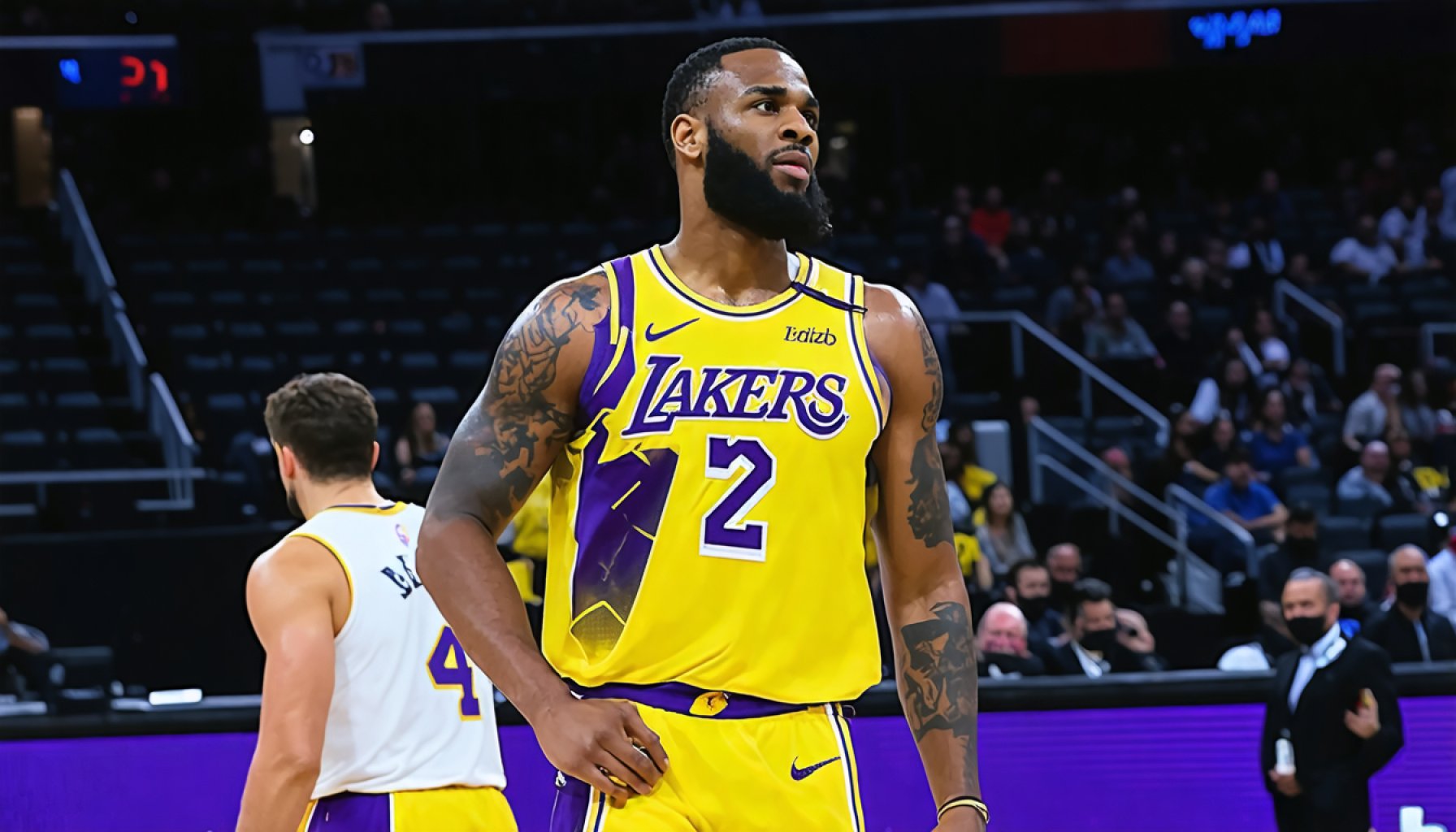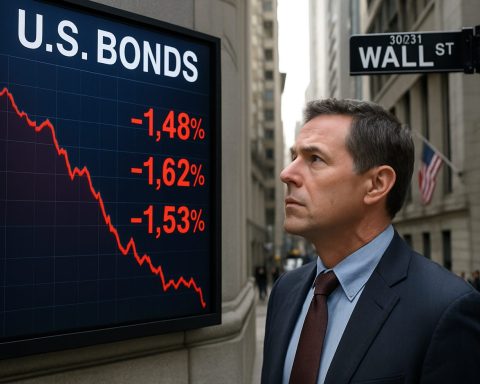- The underdog Minnesota Timberwolves stunned the Los Angeles Lakers with a decisive 117-95 victory, exposing the latter’s defensive vulnerabilities.
- Luka Doncic led the Lakers with 37 points, but the team struggled without cohesive support, highlighted by the Timberwolves’ commanding fast-break advantage of 25-6.
- Jaden McDaniels and Naz Reid were pivotal for the Timberwolves, combining strong presence and unexpected efficiency from beyond the arc.
- Despite head coach JJ Redick’s successful regular-season strategies, his in-game adjustments faltered under the Timberwolves’ relentless pace.
- LeBron James, scoring 19 points, emphasized adaptation and the necessity to “control the controllables” as key to a Lakers’ recovery in Game 2.
- The Lakers face a critical need for swift adaptation in the unforgiving Western Conference to harness playoff potential and reclaim momentum.
Lights blazed over Crypto.com Arena on Saturday night, illuminating a drama that no one anticipated. The Los Angeles Lakers, buoyed previously by a formidable 50-win season and robust support from their fan base, found themselves upended in a 117-95 rout by the underdog Minnesota Timberwolves.
Against a backdrop of high expectations, Luka Doncic shone for the Lakers with a valiant 37 points, yet found scant support in a team that seemed merely a shadow of its former self. The Timberwolves seized their underdog status with astonishing vigor, exploiting every crack in the Lakers’ defense. Timberwolves’ forward Jaden McDaniels led with a commanding presence, capturing 25 points, while towering center Naz Reid’s surprising six out of nine shots from deep kept the Lakers scrambling.
The Timberwolves exposed vulnerabilities, holding the Lakers to under 100 points—a rare occurrence for the Lakers, especially jarring given their previous season performance. In pivotal moments, the Timberwolves’ swift and relentless pace left the Lakers struggling to regroup, as evidenced by Minnesota’s staggering 25-6 edge in fast-break points, rendering the Lakers’ defense merely reactive, rather than proactive.
Back at the Lakers’ bench, head coach JJ Redick faced scrutiny. Although his regular-season strategy electrified the team, his game-turning tactics fell short against the Timberwolves’ relentless push. Even the iconic Magic Johnson shared pointed criticism, noting the tangible absence of adjustments.
Despite the chaos, veteran LeBron James remained a steadying presence, urging his team forward and calmly emphasizing the need to adapt. James, who clocked 19 points despite a scoreless first quarter, understood the dynamic challenges of playoff intensity. He voiced a belief in the Lakers’ ability to recover and rally in Game 2. James’ leadership hinted at a strategic recalibration. As he succinctly put it, “We have to control the controllables.”
James knows well the narrow margins that define success and despair in the playoffs. And yet, the unforgiving Western Conference demands instant evolution—the days afforded to the Lakers to counter the Timberwolves’ momentum are few. But their potential remains undoubted, fueled by lessons learned in Game 1.
In defeat, the Lakers encountered an unanticipated wake-up call. To harness that setback into victory, they must reignite the tenacity that brought them to this precipice and reclaim their narrative against the odds. The series, far from decided, urges the Lakers not only to correct but to conquer.
The court is theirs on Tuesday, the spotlight ready to catch the next chapter in this unfolding saga. Will the Lakers engineer their comeback or falter again? Their destiny, balancing on a knife-edge, beckons for resilience.
The Lakers’ Unexpected Setback: Can They Bounce Back in Game 2?
Game Analysis and Context
The recent clash between the Los Angeles Lakers and the Minnesota Timberwolves provided an insightful, albeit surprising, look into NBA dynamics. Despite the Lakers’ star-power, including Luka Doncic’s impressive 37-point effort, the team fell short against an unexpectedly formidable Timberwolves squad. Key performances from the Timberwolves’ Jaden McDaniels and Naz Reid revealed vulnerabilities in the Lakers’ often sturdy defense, drawing a sharp contrast with their previous season’s success.
Pressing Questions
Why Did the Lakers Lose?
1. Defense Breakdowns: The Lakers were uncharacteristically porous on defense, particularly against fast breaks where they were outscored 25-6.
2. Lack of Scoring Support: While Doncic shone, other players did not provide enough offensive support to compete effectively.
Can the Lakers Recover?
1. Strategic Adjustments: Head coach JJ Redick needs to refine his strategies, especially considering Magic Johnson’s pointed critique about in-game adjustments.
2. LeBron James’ Role: James’ leadership is crucial for morale and strategic recalibration, as highlighted by his post-game comments focusing on adaptation and ‘controlling the controllables.’
Insights & Trends
– Rise of the Timberwolves: The win serves as a reminder of the unpredictable nature of the playoffs, where underdogs often find a way to exploit favored teams’ weaknesses.
– Western Conference Dynamics: The intense competitiveness of the Western Conference means teams must be prepared to adapt quickly, as opportunities to fix issues are limited.
Life Hacks & How-To Steps for Teams Facing Similar Situations
1. Analyze Game Footage: Reviewing game footage can pinpoint weaknesses like defensive lapses or offensive misalignments.
2. Focus on Strength Conditioning: Ensuring players are at peak physical condition to endure the playoff rigors.
3. Team Bonding: Strengthening team chemistry off-court can lead to improved on-court synergy.
Actionable Recommendations for the Lakers
– Prioritize Defense: Revamp defensive strategies to prevent easy scores, particularly in transition.
– Enhance Scoring Diversity: Encourage role players to step up and relieve scoring pressure off main stars.
– Utilize Bench Depth: Flexibility in rotations could introduce fresh dynamics that break the Timberwolves’ rhythm.
Pros & Cons Overview
Pros for the Lakers:
– Star power with Doncic and LeBron able to change game trajectories.
– Historical resilience and tactical adaptability.
Cons for the Lakers:
– Current inconsistency in defensive play.
– Potential over-reliance on individual performances.
Conclusion
For the Lakers to rebound in Game 2, they must embrace strategic recalibration and broaden their defensive and offensive plays. The responsibility lies in harnessing core strengths and acknowledging exposed vulnerabilities. By fostering team-wide contributions and maintaining playoff intensity, the Lakers can not only recover but chart a victorious path through the series.
Suggested Related Links
Engage in the conversation ahead of Tuesday’s showdown—will the Lakers adapt and overcome, or will the Timberwolves continue their remarkable run? The forthcoming matchup promises to be a compelling spectacle set against the drama of playoff basketball championships.







